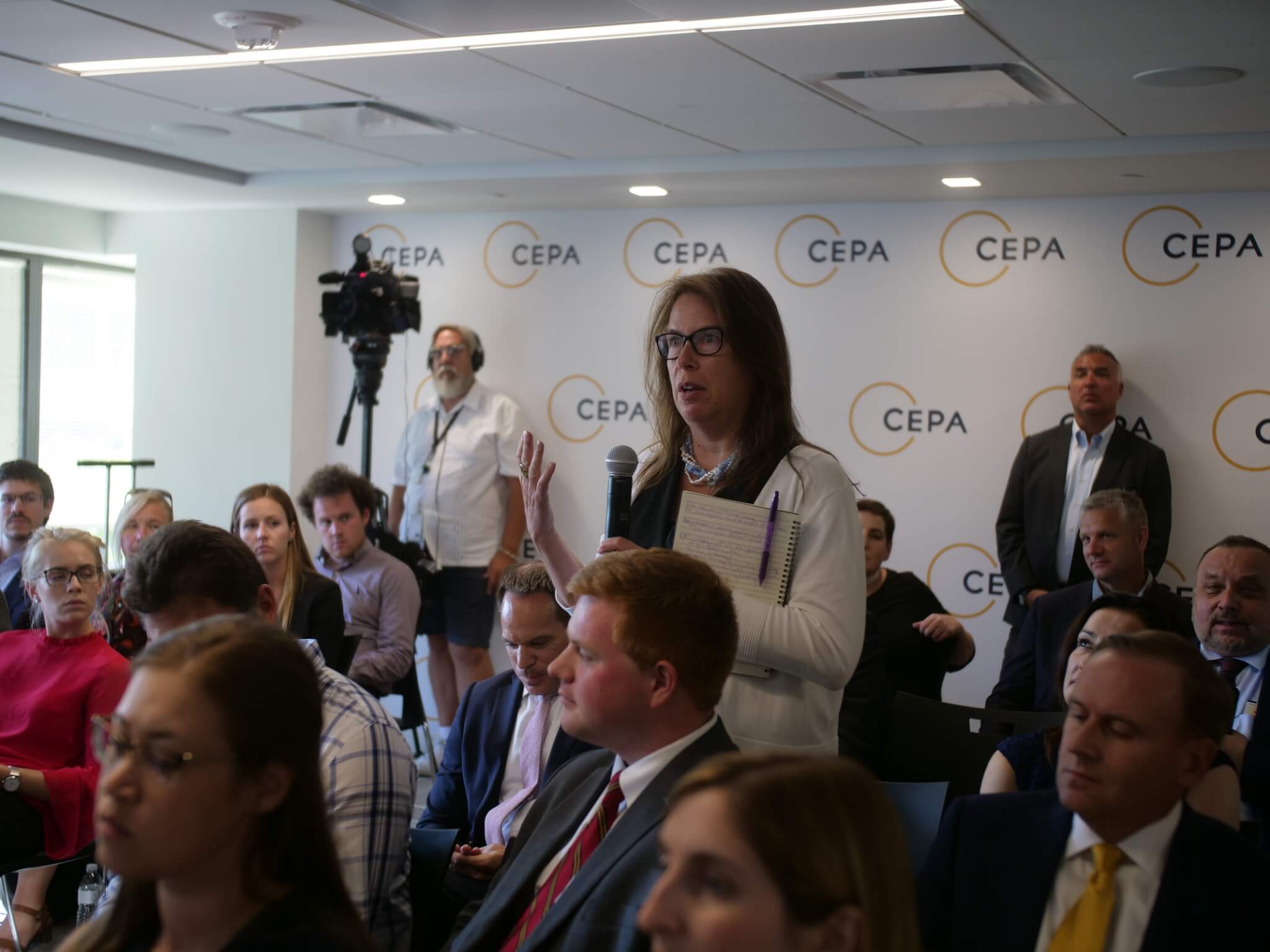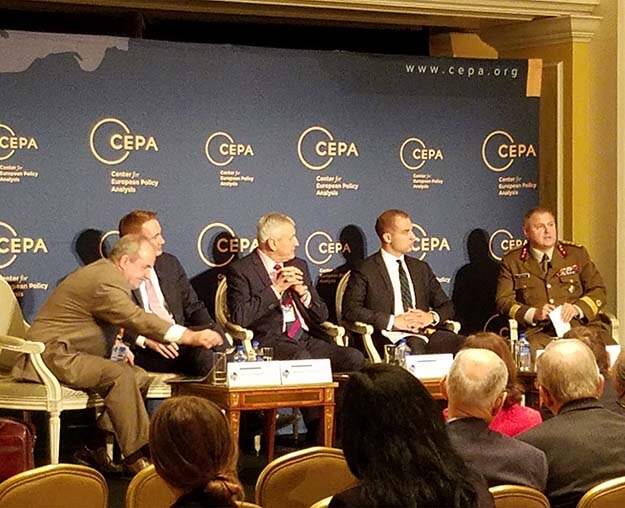
EANC’s Karin Shuey sharing her perspective with the CEPA audience (photo courtesy of CEPA)
Estonian American National Council (EANC) Washington, DC Director Karin Shuey recently attended back-to-back events with very different views of NATO, transatlantic relations, and the political order in Europe. The Center for Strategic and International Studies (CSIS) event “Prospects for U.S.-Russia Relations: A Perspective from Moscow” presented a rundown of the Kremlin’s priorities and vision for Europe, the world, and U.S. relations. Later the same evening, the Center for European Policy Analysis (CEPA) held a discussion on NATO and debuted a video showing interviews with average Americans sharing their impressions of the alliance.

Screenshot of CSIS event webcast (source: CSIS website)
The CSIS event featured Dmitry Suslov, Deputy Director of the Faculty of World Economy and International Affairs at the Higher School of Economics in Moscow. A webcast of the discussion is available at the CSIS website under past events for July 15, 2019. The speaker laid out a thorough outline of Kremlin strategy, explained that U.S.-Russia relations are likely to remain adversarial for the next six to ten years, and predicted that relations will improve only when the current Western liberal order fails.
Suslov cited Russian President Putin’s top priority as facilitating that failure so that he may take a prominent position in a new multipolar stability that redefines the world order, the meaning of sovereignty, rules for use of force, and other aspects of international relations. Suslov stated that “as long as Europe chooses to remain NATO-centric and U.S.-led, Russia will continue to try to destroy” those ties.
The CEPA event emphasized the successes and positive aspects of NATO to a supportive audience that appeared to be well-versed in the history and evolution of the alliance. Questions and discussion focused on challenges currently facing the transatlantic relationship, including Turkey’s recent purchase of the Russian S-400 missile system, Chinese investment in Europe, the continued occupations of Georgia and Ukraine, and “the importance of military exercises as a tool…to enhance U.S. and European security…[and] to strengthen transatlantic bonds on the ground,” according to the CEPA summary of the event at www.cepa.org/discussion-with-ben-hodges.
The CEPA video featured its own expert, retired Lieutenant General Ben Hodges, on the road at universities and local communities talking with small groups of citizens about their understanding of NATO. In general, the video demonstrated that the discussion participants had at least some awareness of, and appreciation for, NATO and its role in history but lacked details on its values and importance today. CEPA plans to publish the short film on its website soon.
A common gap in recognition of NATO’s founding principles was evident in these three contexts: the Russian perspective seemed to deny or ignore them; the CEPA audience took them for granted; and the so-called average Americans may never have fully learned what NATO stands for at its core. Below is a reminder of a few key aspects of NATO that should remain at the forefront in any considerations regarding the alliance’s future and the future of Russia’s relationship with the West:
1. NATO is a defensive alliance committed to the peaceful resolution of disputes and to the shared principles of individual liberty, democracy, human rights and the rule of law. The Kremlin’s narrative falsely claims that NATO is an aggressor that actively threatens Russian interests.
2. Membership is voluntary based on the will of the nations seeking membership. The Kremlin’s narrative falsely claims that NATO is a U.S.-led alliance that imposes U.S. policies on its members.
3. Russia has been offered a seat at the European table several times. Official contacts between Russia and NATO began in 1991 under the North Atlantic Cooperation Council’s framework, which evolved into the Euro-Atlantic Partnership Council in 1997.
Russia also joined the Partnership for Peace program in 1994 and remains a member of both institutions today. The 1997 NATO-Russia Founding Act further formalized relations.
The relationship soured with the 2008 invasion of Georgia. After the invasion of Ukraine in 2014, NATO’s foreign ministers issued a statement announcing their decision to suspend “all practical civilian and military cooperation between NATO and Russia.” The full statement is available at www.NATO.int in the Newsroom section by searching for “Statement by NATO Foreign Ministers” dated April 1, 2014.
While the Kremlin narrative calls for Russia to have a say in the development of European policies, the fact is that Russia was invited into European institutions until it violated its neighbors’ sovereignty and international law. The Kremlin has a long track record of behavior that clearly violates all of the principles stated above and disqualifies Russia from the status it seeks.
These are just a few basic points that deserve repeating in an environment that calls NATO into question while not telling the whole story. It’s easy to forget important details when incomplete and conflicting information is readily available online. For further reliable and complete information on NATO, please see www.nato.int/nato-welcome and NATO-Russia – Setting the Record Straight under the NATO website’s Topics heading. EANC encourages our readers to understand the importance of NATO membership and to help ensure that Estonia has the full support of NATO and the U.S. against the Russian threat by engaging with your Members of Congress on the topic. Please also see estosite.org/speak-up-for-estonia for more on our work with Congress and how you can help.
Karin Shuey
Washington, DC Director
Estonian American National Council
www.estosite.org














